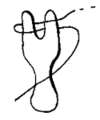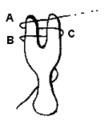Lucets
Revision as of 13:30, 28 August 2018 by Admin (talk | contribs) (Copied content over from regia.org)
Many everyday objects were hung from the waist by these type of cords. Useful for drawing up bags and purses, garments were laced up with cords or 'chains' as they were termed.
Lucets were often crudely made of horn, bone or wood.
This method of weaving gives a cord of squared proportions. You can keep on knotting threads almost indefinitely, and with a thick thread, the cord formed is very strong. The method of knotting does not make the cord elastic in any way however.
- Thread lucet thus (tie a knot);
- Flip lucet over from right to left;
- Lift A over B with a needle, holding tail of yarn firmly against lucet handle;
- Pull to tighten knot against right hand prong.
- Repeat 2, 3 & 4. (Pull end C occasionally to keep cord taught and square)
References
"The History of Needlework, tools and accessories" by Sylvia Groves.


